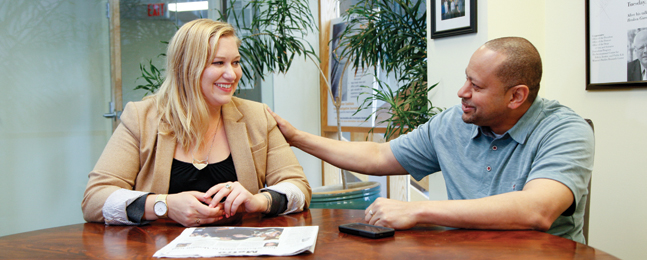Innocence Regained

Mike Lovett
RIGHTING A LENGTHY WRONG: Lindsay Markel '08 with Angel Echavarria after his release. Working behind the scenes on his case inspired her to become a public defender, she says.
by Julian Cardillo ’14
The wheels of justice grind slowly.
No one knows this better than Angel Echavarria, who spent 21 years in prison for a murder he says he didn’t commit. Now, thanks in large part to Brandeis’ Schuster Institute for Investigative Journalism, Echavarria is a free man.
In 1994, Echavarria was accused of murdering a drug dealer in Lynn, Mass. Just after the shooting, the victim’s brother identified another man as looking like the murderer. Police never investigated this lead. Ten days later, the victim’s brother changed his mind, and told police that Echavarria was the shooter.
Echavarria didn’t fit the description the victim’s brother originally gave: Puerto Rican, 20 years old, cleanshaven, a “stocky” or “chunky” build. At the time of his arrest, Echavarria was a 27-year-old Dominican who was 5 feet 10 inches tall, weighed 135 pounds and had a full mustache. But police arrested him anyway, and in 1996 he was convicted of first-degree murder and given a life sentence.
Ten years into Echavarria’s sentence, Florence Graves — the founding director of the Schuster Institute and creator of the institute’s Justice Brandeis Law Project, which examines cases involving a likely wrongful conviction — heard about his story.
“We could not understand why Angel had been convicted,” Graves says. “There was no physical evidence against him, and the evidence presented against him seemed deeply flawed.”
The Law Project took on the Echavarria case, and a team of investigators and Brandeis student researchers began poring over the case files. A new attorney submitted a motion for a new trial five years ago using much of the Law Project’s evidence. Last December, an evidentiary hearing was held regarding that motion.
In April, an Essex County (Mass.) superior court judge granted Echavarria a new trial, citing the ineffective assistance of his original trial counsel. On May 18, Echavarria’s conviction was vacated, and the 48-year-old was released from prison wearing an ankle monitoring bracelet.
A little less than a month later, the Essex County district attorney announced his office would not retry Echavarria, the ankle bracelet was removed, and Echavarria became truly free.
Lindsay Markel ’08, who worked on the case as Schuster Institute assistant director (she was profiled in the Spring 2012 issue of Brandeis Magazine), was in the courtroom when Echavarria’s murder conviction was vacated. She even attended the celebration that marked his first post-prison meal (he ate lobster). That same month, she graduated from the UC Berkeley School of Law, and will become a public defender in New Orleans.
“I’m absolutely overjoyed that Angel does have a chance now to enjoy time with his family and get his life back,” Markel says.
Echavarria says he’s grateful for the work the Schuster team did in his behalf. “I believed in them, because I knew that they’re very intelligent,” he says. “I never gave up. I put my trust in them, because I knew they were doing a good job.”
